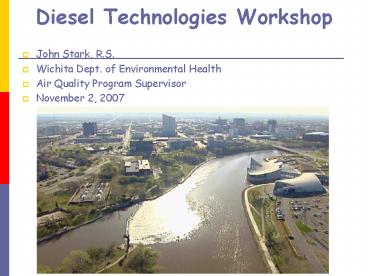Diesel Technologies Workshop - PowerPoint PPT Presentation
1 / 21
Title:
Diesel Technologies Workshop
Description:
How does all this tie into your bottom line? Diesel Emission ... How About a Segway? More Idle Reduction Information. Diesel retrofits all the nuts and bolts ... – PowerPoint PPT presentation
Number of Views:19
Avg rating:3.0/5.0
Title: Diesel Technologies Workshop
1
Diesel Technologies Workshop
- John Stark, R.S.
- Wichita Dept. of Environmental Health
- Air Quality Program Supervisor
- November 2, 2007
2
Overview
- A word or two about air pollutants
- How is EPA/KDHE/City of Wichita involved?
- Current Wichita Air Quality Status
- Proposed new federal ozone standard (EPA)
- Why reduce diesel emissions?
- What are your options?
- How does all this tie into your bottom line?
3
Diesel Emission Overview
- Major sources of NOx, PM 2.5, and CO
- Emissions per vehicle are dropping
- Cleaner engines
- Ultra low sulfur diesel
- Miles traveled is increasing
- Older vehicles do not benefitfleet turnover may
take 25 years
4
Background
- Commercial freight truck and rail
- Travel over 200 billion miles annually
- Consume over 55 billion gallons of fuel
- Account for about 20 of transportation related
energy use - Produce approximately 350 million metric tons of
CO2
55 billion gallons of gasoline and diesel
5
Air PollutantsParticulate Matter (smoke, dust,
etc)
- Finer particles are more dangerous to our health
- Diesel exhaust is a significant contributor
- Reducing emissions reduces our health risks
- Required by EPA to measure Particulates (NAAQS)
6
Air Pollutants - Nitrogen Oxides
- Combine with fuels and solvents to form ozone
- Nitrogen Oxides are linked to respiratory
illnesses - Diesel engines are major contributors to nitrogen
oxides emissions - Required by EPA to measure (NAAQS)
7
Mobile Source Diesel Emissions Inventory by
Sector (2004)
NOx (6.3 million tons)
PM 2.5 (305,000 tons)
Freight 32
Freight 56
8
Air Pollutants -Ground-level Ozone
- Its all O3 - Good up high, bad nearby
- In this presentation we are talking about
ground-level ozone - Causes respiratory problems
- Forms from emissions from cars, trucks, homes,
businesses, utilities, and industry. - Required by EPA to measure (NAAQS)
9
Importance of reducing emissions
- Health and Environmental protection
- New standards on the horizon (Ozone)
- Whats good for the environment can be good for
your bottom line.
10
What steps are in place?
- Regulations controlling Industrial sources
- Area source reduction programs
- Mobile source reduction programs
- (Mandatory in Kansas City area only)
- Voluntary vehicle testing (gasoline) Wichita
11
Ozone Trends through 2006
Our current ozone average is .073 PPM We are
currently not in violation of EPAs federal ozone
standard.
12
What do we do if EPA lowers the Ozone standard?
- Current EPA standard 84 ppb
- Current Wichita level 73 ppb
- HOWEVER..
13
Voluntary Actions
- Trucking
- Maintain your engine
- Tune to factory specs
- Retrofit existing equipment
- Purchase equipment with emission reduction
technologies - Implement an idle reduction program
- Warehouses
- Implement an idle reduction policy
- Accommodate truckers needs
- Decrease wait time
14
Communities are taking steps
15
Idle Reduction Technologies
- Turning the key to the left
- Diesel auxiliary power units
- Battery powered Units
- Automatic shutdown/startup systems
- Engine pre-heaters
- Truck Stop Electrification
16
Fuel Trends
17
Fuel Prices Impact on Industry
(Companies with 5 or more trucks)
Source A.G. Edwards, US Department of Energy,
and ATA
18
Bottom Line
- Benefits of Reduced Idling Policies and Retrofit
Technologies - Reduced Fuel Usage Reduced Operating Costs
- Reduced Maintenance Reduced Operating Costs
- Reduced Air Pollution Reduced Health Risk
19
How About a Segway?
- More Idle Reduction Information
- Diesel retrofits all the nuts and bolts
- Diesel Technology Forum exposition
- See whats new up close
- How it works
- Next up Durham School Services
- Idle Reduction Project Wichita Public Schools
- Reduced exposure to air pollutants
- Students Drivers
- Reduced operating costs
20
- Loans
- National Smartway Truck Loan Program
- Small Business Loan Program
- Grants
- Small Business Advantage Grants
- Congestion Mitigation and Air Quality
- Tax Incentives???
21
Idle Reduction Ordinances
- EPA Model Rule developed in 2006 after extensive
outreach with trucking industry - Shares responsibility between drivers and
warehouses - More than 20 states and several municipalities
have them (Including Kansas City area) - Ordinance parts
- Restriction on idle time (3-10 minutes)
- Minimum weight applicability (8,500-10,000 lbs)
- Exceptions (extreme weather, emergency vehicles,
refrigeration trucks, service/repair vehicles)































